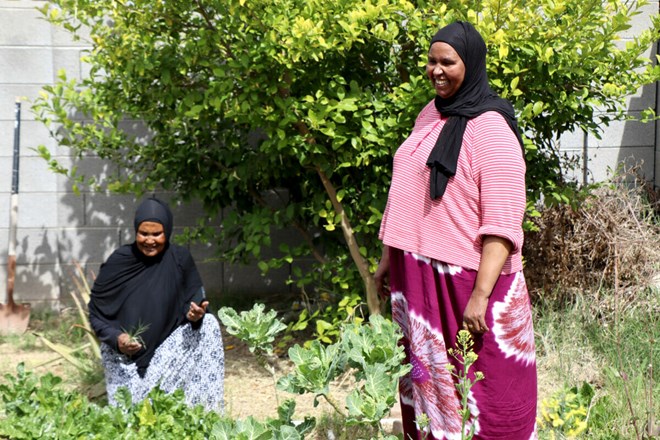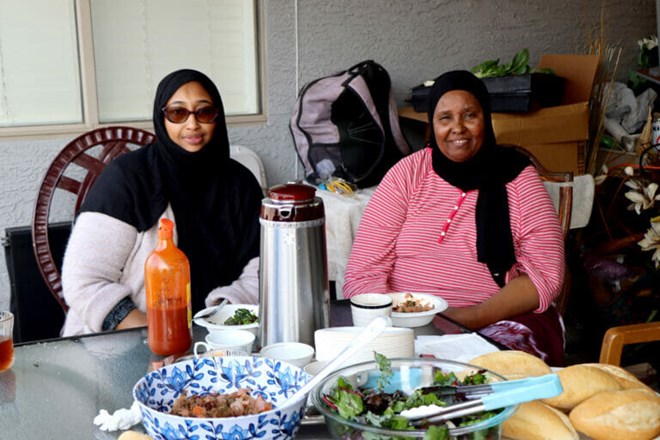Modern Farmer
Thursday April 13, 2023
By Callie Radke Stevens
Drinking Gourd Farms helps people start their own homesteads and experience food freedom.

Kadija Farah (left) and Ibado Mahmud (right) are Somali refugees who grow food as part of the Drinking Gourd Farms collective. Photography by Callie Radke Stevens.
Ibado Mahmud lives in a typical house in an Arizona development, and from the front, any visitor might be mistaken for thinking it is just that: typical. But Mahmud’s ordinary home hides an abundant homestead garden stretching from the house all the way to the brick wall marking the edge of the property. It is one of the many homestead gardens that make up Drinking Gourd Farms.
Mahmud helped start the Phoenix-based collective in 2019 with a mission to grow both food and justice. Her house is one of seven or eight mainstay gardens—since teaching people to grow their own food is also part of the mission, the exact number varies. Mahmud estimates the collective has helped start 20 to 30 gardens around the city. “I think it’s good that people have that knowledge—to grow their own food,” she says.
advertisements
Kadija Farah has a garden, too, although it looks a little different than Mahmud’s. Farah’s garden has turned her small condo terrace into an Eden, spilling out of containers and a small strip of earth. In the garden, “I feel relief,” Farah says. “It’s good. It encourages me what I can learn.”Any food from Drinking Gourd that the hosts and volunteers don’t eat themselves is harvested and distributed to families who lack the money or time to grow their own healthy produce. At the height of the pandemic, they were distributing food to around 165 families each week (supplementing their year-two produce with food bought with stimulus checks). Now, the number is closer to 25 each week. Some of the backyard owners donate or exchange garden space, allowing people who live in apartments to come and grow food, too.
The collective focuses on marginalized communities and upholds a vision of Black food sovereignty, although Mahmud says that it would help anyone who was in need and teach anyone who wanted to learn.
“It’s important to grow food, no matter who you are,” she says. “Let’s go back to our ancestors and create our own food.”
Mahmud herself knows something about the importance of a collective that shares food, gardening opportunities and community. She and Farah both came to the United States as refugees from Somalia in 1993. There wasn’t much of a support system; she had young children, and she didn’t speak the language well. A resettlement agency provided some food, but she didn’t know how to make sure something was pork-free to maintain her religious dietary convictions. It was a difficult time. Now, she hopes Drinking Gourd can provide the community she didn’t have 30 years ago.
The garden has seen plenty of trial and error. While Mahmud’s father farmed during her childhood, she and the other gardeners were starting from scratch when it came to farming in the urban soil of Arizona. The first year was all new, and Mahmud says that now, in year four, she and the onsite manager are still learning from other farms and gardens and from their own experience.
“We’ve put a lot of time, a lot of labor into the soil,” says Mahmud. “You will know what is right and what is not when you get to do it.”

Mahmud (right) makes breakfast for volunteers every Saturday using produce from the garden. (Photo: Callie Radke Stevens)

Mahmud (right) makes breakfast for volunteers every Saturday using produce from the garden. (Photo: Callie Radke Stevens)
Mahmud and others involved with Drinking Gourd dream of some day buying a farm-size parcel of land where they could grow all the food they need. Mahmud also has a vision of providing work and community for those coming out of incarceration, creating a farm that is a safe space for people to reintegrate. Already, as food prices rise, the gardens can’t always meet demand. And while Drinking Gourd maintains a small staff, they had to go several months without pay when the collective ran out of funding last year. “We’re just praying that we can do more,” she says.
Standing in the backyard garden, Mahmud points to the rows of greens; these are the things she grows that remind her of home. The garden, the collective and the mission help remind her who she is, she says.
“My father used to tell me, ‘When you are somewhere new, show them who you are,’” says Mahmud. By growing food, sharing it and teaching others to do the same, she is doing just that.